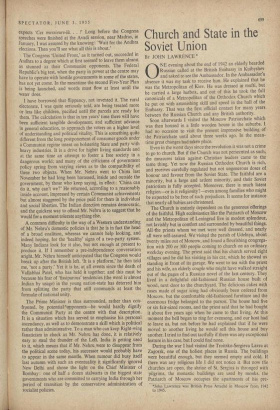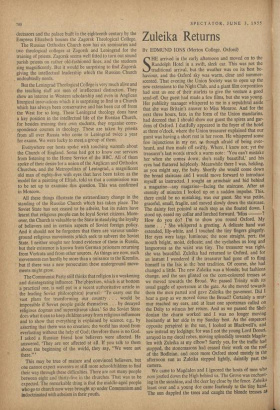Church and State in the Soviet Union
BY JOHN LAWRENCE " 0 NE evening about the end of 1942 an elderly bearded Russian called at the British Embassy in Kuibyshev and asked to see the Ambassador. In the Ambassador's absence it was my task to receive him. He explained that he was the Metropolitan of Kiev. He was dressed in mufti, but he carried a large hatbox, and out of this he took the full canonicals of a Metropolitan of the Orthodox Church which he put on with astonishing skill and speed in the hall of the Embassy. That was the first official contact for many years between the Russian Church and any British authority.
Soon afterwards I visited the Moscow Patriarchate which was then housed in a little wooden house in the suburbs. I had no occasion to visit the present impressive building of the Patriarchate until about three weeks ago. In the mean- time great changes had taken place.
Even in the worst days since the revolution it was not a crime to go to church. But if the Church was not persecuted as such. the measures taken against Christian leaders came to the same thing. Yet now the Russian Orthodox Church is rich, and receives carefully regulated but not ungenerous doses of honour and favour from the Soviet State. The faithful are a minority, but a large and ardent minority, and their Soviet patriotism is fully accepted. Moreover, there is much latent religion—or is it religiosity?—even among families who might be expected to be free of such prejudices. It seems for instance that nearly all babies are christened.
The Church is entirely dependent on the generous offerings of the faithful. High ecclesiastics like the Patriarch of Moscow and the Metropolitan of Leningrad live in modest splendour, not lavishly but in comfort and surrounded by beautiful things. All -the priests whom we met were well dressed, and nearly all were self-assured. We visited the parish of Udelnya, abOtit twenty miles out of Moscow, and found a flourishing congrega- tion with 200 or 300 people coming to church on an ordinary weekday evening. The priest said that his church served eight villages and he did his visiting in his car, which he showed us standing in front of its garage. We went to tea with the priest and his wife, an elderly couple who might have walked straight out of the pages of a Russian novel of the last century. They lived in a delightful old-fashioned Russian house built of wood, next door to the churchyard. The delicious cakes with roses made of sugar icing had obviously been ordered from Moscow, but the comfortable old-fashioned furniture and the enormous fridge belonged to the parson. The house had five or six fair-sized rooms, and the priest said that he had bought it about five years ago when he came to that living. At this moment the bell began to ring for evensong, and our host had to leave us, but not before he had explained that if he were moved to another living he would sell this house and buy another. I tried to find out tactfully if there was any exceptional feature in his case, but I could find none.
During the war I had visited the Troitsko-Sergieva Lavra at Zagorsk, one of the holiest places in Russia. The buildings were beautiful enough, but they seemed empty and cold. 11 there was any religious life I did not notice it. But now the churches are open. the shrine of St. Sergius is thronged with pilgrims, the monastic buildings are used by monks, the Patriarch of Moscow occupies the apartments of his pre- "John Lawrence was British Press Attaché in Moscow from194/ to 1945. dec'essors and the palace built in the eighteenth century by the Empress Elizabeth houses the Zagorsk Theological College.
The Russian Orthodox Church now has six seminaries and two theological colleges at Zagorsk and Leningrad for the training of priests. Zagorsk seems well fitted to turn out sound parish priests on rather old-fashioned lines, and the students sing magnificently. But it would be surprising to find Zagorsk giving the intellectual leadership which the Russian Church undoubtedly needs.
But the Leningrad Theological College is very much alive and the teaching staff are men of intellectual distinction. They show an interest in Western scholarship and even in Anglican liturgical innovations which it is surprising to find in a Church which has always been conservative and has been cut off from the West for so long. These Leningrad theology dons have a key position in the intellectual life of the Russian Church, for besides training their own students, they organise corre- spondence courses in theology. These are taken by priests from all over Russia who come to Leningrad twice a year for exams. We were lucky to meet a group of them.
Everywhere our hosts spoke with touching warmth about the Church of England. Some had got to know our services from listening to the Home Service of the BBC. All of them spoke of their desire for a union of the Anglican and Orthodox Churches, and the Metropolitan of Leningrad, a magnificent old man of eighty-five with eyes that have been taken as the model for a painting of Elijah, told us that a commission was to be set up to examine this question. This was confirmed in Moscow.
All these things illustrate the extraordinary change in the standing of the Russiiin Church which has taken place. The Soviet State has not ceased to be atheist, but its rulers have learnt that religious people can be loyal Soviet citizens. More- over, thb Church is valuable to the State in steadying the loyalty of believers and in certain aspects of Soviet foreign policy. And it should not be forgotten that there are various under- ground religious movements which seek to subvert the Soviet State. I neither sought nor found evidence of these in Russia, but their existence is known from German prisoners returning from Vorkuta and from other sources. As things are now, such movements can hardly be more than a nuisance to the Kremlin, but if there was a new persecution these underground move- ments might grow.
The Communist Party still thinks that religion is a weakening and disintegrating influence. The objection, which is at bottom a practical one, is well put in a recent authoritative article in the leading Soviet philosophical journal : 'To carry out the vast plans for transforming our country . . . would be impossible if Soviet people guide themselves . . . by decayed religious dogmas and superstitious ideas.' So the Soviet State does what it can to keep children away from religious influences and to show that everything is explained by science, e.g.. by asserting that there was no creation; the world has stood from everlasting without the help of God; therefore there is no God. I asked a Russian friend how believers were affected. He answered, 'They arc not affected at all. If you talk to them about the beginning of the world, they say, "We were not there." '



































 Previous page
Previous page